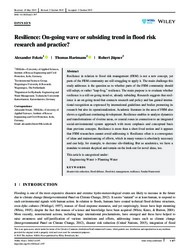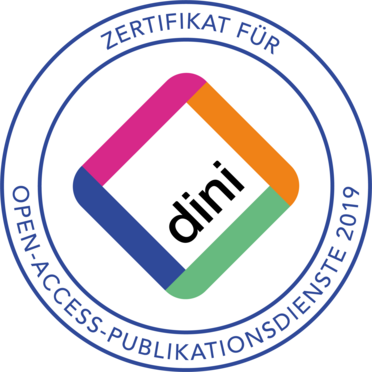Resilience: On-going wave or subsiding trend in flood risk research and practice?
DOI: https://doi.org/10.1002/wat2.1397
Persistent URL: http://resolver.sub.uni-goettingen.de/purl?gldocs-11858/9379
Persistent URL: http://resolver.sub.uni-goettingen.de/purl?gldocs-11858/9379
Fekete, Alexander; Hartmann, Thomas; Jüpner, Robert, 2019: Resilience: On-going wave or subsiding trend in flood risk research and practice?. In: Wiley Interdisciplinary Reviews: Water, Band 7, 1, DOI: 10.1002/wat2.1397.
 |
Dokument öffnen: |
Resilience in relation to flood risk management (FRM) is not a new concept, yet parts of the FRM community are still struggling to apply it. The main challenge this study addresses is the question as to whether parts of the FRM community should still adopt, or rather “leap-frog,” resilience. The main purpose is to evaluate whether resilience is a still on-going trend or, already subsiding. Research suggests that resilience is an on-going trend that connects research and policy and has gained international recognition as expressed by international guidelines and bodies promoting its research but also its operationalization. Academic literature in the area of FRM also shows a significant continuing development. Resilience enables to analyze dynamics and transformations of riverine areas, or coastal zones in connection to an integrated social-environmental system approach with more emphasis and conceptual basis than previous concepts. Resilience is more than a short-lived notion and it appears that FRM researchers cannot avoid addressing it. Resilience often is a convergence of ideas and mainstreaming of efforts, which in many venues is absolutely necessary and can help, for example, to decrease silo-thinking. But as academics, we have a mandate to remain skeptical and remain on the look-out for novel ideas, too.
This article is categorized under:
Engineering Water > Planning Water
Statistik:
ZugriffsstatistikSammlung:
Schlagworte:
disaster risk reductionflood defense
flood risk management
resilience
Sendai Framework
This is an open access article under the terms of the Creative Commons Attribution-NonCommercial License, which permits use, distribution and reproduction in any medium, provided the original work is properly cited and is not used for commercial purposes.

